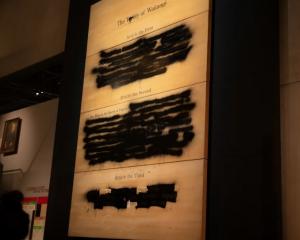
But the Speaker of the Leader of the House today denied this was the case.
The legislation seeks to ban the types of weapons used in a terror attack on two Christchurch mosques last month. Fifty people were killed and more than 40 injured on March 15. A man has been charged with murder.
The Government sought leave to streamline the new gun law’s passage through Parliament, including having the first reading this afternoon.
Seymour was planning on blocking such an attempt, which would have forced the Government to use urgency, but was too busy talking to media and not in the House when a motion for an expedited process was moved.
Other MPs have criticised him for this, with Acting Prime Minister Winston Peters saying it showed Seymour was a “disorganised lad”.
“You expect people to back up what they say with their actions, but he didn’t even bother to turn up.”
But after missing his chance, Seymour told media the saga was “something you’ve got to laugh off” and quickly pointed the finger at the Government.
“The fact that they had to take the chance for the one minute I wasn’t there shows that there is no one else standing up to this Government.”
He said that leave is normally sought before the bill is debated in the House and after Question Time.
“They brought it forward precisely because they knew the only person who would object was me and they had to do it while Act wasn’t there.”
But Leader of the House Chris Hipkins said this was not the case.
He said if the Government was planning on doing something out of the ordinary - such as having the first reading of the gun bill today - then it was usual to seek the House’s permission at the start of Question Time.
“There is not a lot of point in grandstanding if you don’t show up to Parliament for the vote.”
Speaker Trevor Mallard told The New Zealand Herald there was nothing untoward about what happened in the House.
“There is an obligation on the Speaker, if leave is properly sought, to put the leave to the House and that’s what I did. All I did was do the standard approach when leave is sought”.
The bill passed its first reading this afternoon, with Seymour the only MP to oppose it.
Seymour told the House the bill was more about “political theatre”, but Police Minister Stuart Nash said it was about public safety.
“We are also driven by the memory of fifty men, women and children who were taken from their loved ones on March 15. Their memory is our responsibility,” Nash said.
The legislation will ban military-style semi-automatic (MSSAs) and assault rifles, and shotguns with detachable magazines or internal magazines that hold more than five rounds.
Magazines holding more than five cartridges for a shotgun and more than 10 cartridges for a .22 calibre rimfire weapon will also be banned, as will any other magazine capable of holding more than 10 cartridges.
Gun components that can be used to make a banned firearm will also be outlawed, as will certain ammunition through Order in Council.
There were currently 7500 firearms licence holders with a special licence for MSSAs, who between them have about 14,000 guns.
“Many more have semi-automatic firearms in a so-called sporting configuration and are easily converted to an MSSA,” Nash said.
“Far too many people in this country have access to these dangerous firearms for no legitimate purpose, but at significant risk to the public.”
The Game Animal Council supported the bill, saying it will have “little significant impact” on hunting for tahr, deer, chamois and feral pigs.
National MPs voted for the bill, though Amy Adams said it would be better to know further details of the proposed buyback scheme.
“The public of New Zealand deserve to know a little bit more about how that will work.”
The buyback scheme is estimated to cost up to $200 million, but it could be higher as Nash has said the number of AR-15s - the gun used in the Christchurch terror attack - is unknown.
National MP Judith Collins called on the Government, in its second round of changes to gun legislation, to empower police to go after gangs’ weapons through firearms prohibition orders.
“The best way forward is give police the powers, give them the firepower to it, and get on and take them.”
Nash has said that such orders may be considered later this year.
Collins also called for a national firearms register, which the Government will also consider later this year.
She said it would be naive to think that such a register would mean that every single firearm in New Zealand would be known, “but when one is sold or lost or stolen, there will be an obligation to advise police, and that will be noted”.
“If I have to register my dog, why would I not have to register a gun? That seems to me totally crazy.”
The bill will be considered at select committee for a week. The Government wants it to be in force by April 12.
POLICE ANALYSIS
Police this morning released its Interim Supplementary Analysis on the legislation.
Although giving more clarity around the proposed law, the analysis was "constrained by the tight timeframes" given the bill was being rushed through the House under urgency.
It said the final details of the bill were being work on right up until it was due to go before the Cabinet yesterday.
"Without these, it is difficult to identify with accuracy the impacts and risks of the proposal.
"This equally applies to details in the buyback scheme which is unlikely to be fully resolved until after the bill is introduced to Parliament."
Because of these factors, the police's analysis was only general - "but has been included to signal the clear intent of the Government to compensate people who surrender prohibited firearms during the amnesty period".
Police said there was a risk of a black market for firearms being created because of the new law.
"The most likely source of a black market in prohibited firearms in New Zealand would be from the unknown quantity of semi-automatic centrefire and certain shotguns that are held on a standard firearms license, or already held illegally that are not surrendered to Police.
"This particularly applies to guns that have been sold privately."
But police said despite this, the bill is expected to create an overall safer environment for New Zealand.
Comments
How stupid do you have to be, to vote for someone as stupid as this? Shame on the people who elected him.
It's time for the Gun Lobby to stop having a tantrum. They've gone and tarred over 300 thousand gun owners with the epithet "criminal", due to govt legislation. Get a marketing man and stfu.












